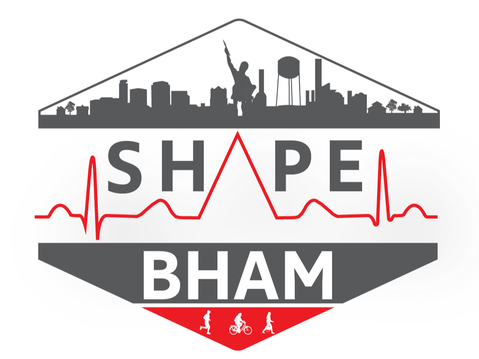The Shape Bham & Planning Connection
Health is a central factor in the quality of life of Americans and is increasingly recognized as a human rights issue. Yet, the intersection of health and planning policies, especially local planning policy initiatives, is not always obvious. The City of Birmingham Comprehensive Plan and Framework Plans sit at the intersection of planning and health. These documents can shape whether a community has access to a host of health promoting assets such as parks, walking and biking trails, or a fresh grocery market. In the same vein, they can intentionally or unintentionally restrict access, and construct or reinforce an unhealthy physical environment. However, the Comprehensive Plan and Framework Plans lack a quantitative and qualitative method for measuring the impact of their policies on a neighborhood’s quality of life. This is where the Shape Bham project can play an integral role in connecting planning and health policies. Through Shape Bham, a uniform assessment tool will be created to not only help city planners and elected officials measure the quality of life for the city’s neighborhoods, but also to enable the City to implement a health lens in all ongoing and future plans and policy proposals. Furthermore, this will allow the City to proactively target equitable access to health promoting resources across all neighborhoods, particularly those with below average quality of life and health measures.
Comprehensive Plan & Framework Plans
In 2013, the City of Birmingham adopted its first comprehensive plan in more than 50 years. As the first comprehensive plan since 1961, the Comprehensive Plan emblematizes the vision of citizens for Birmingham over the next 20 years and puts the City on a new strategic path towards a renaissance of neighborhoods, a strong economy with more jobs, and more opportunity and quality of life for all.
Building on the momentum of the recently adopted comprehensive plan, the City is collaborating with the Regional Planning Commission of Greater Birmingham (RPCGB) to develop nine framework plans. These plans are extensions of the Comprehensive Plan and address issues and opportunities at a community level – thereby providing a more refined and responsive approach to specific community needs than the City’s Comprehensive Plan.
Six framework plans have been adopted thus far – Titusville, North Birmingham, Western Area, Northeastern Area, Southwestern Area, and Pratt Ensley. The Eastern Area framework plan is currently under review, and the Northside/Southside and Southern Area framework plans are in progress. The framework planning process usually takes about one year to complete. The goals and recommendations found in each framework plan are based around the following key topics: Community Renewal, Green Systems, Economic Vitality, Transportation and Infrastructure, Future Land Use and Strategic Opportunity Areas.
Building on the momentum of the recently adopted comprehensive plan, the City is collaborating with the Regional Planning Commission of Greater Birmingham (RPCGB) to develop nine framework plans. These plans are extensions of the Comprehensive Plan and address issues and opportunities at a community level – thereby providing a more refined and responsive approach to specific community needs than the City’s Comprehensive Plan.
Six framework plans have been adopted thus far – Titusville, North Birmingham, Western Area, Northeastern Area, Southwestern Area, and Pratt Ensley. The Eastern Area framework plan is currently under review, and the Northside/Southside and Southern Area framework plans are in progress. The framework planning process usually takes about one year to complete. The goals and recommendations found in each framework plan are based around the following key topics: Community Renewal, Green Systems, Economic Vitality, Transportation and Infrastructure, Future Land Use and Strategic Opportunity Areas.
If you're interested in learning more please visit ImagineBham.com to learn about the city framework plans
